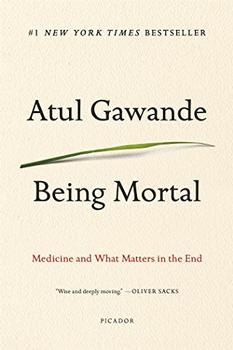Summary | Excerpt | Reading Guide | Discuss | Reviews | Beyond the Book | Readalikes | Genres & Themes | Author Bio

Medicine and What Matters in the End
by Atul Gawande
I began writing when I was a junior surgical resident, and in one of my very first essays, I told the story of a man whom I called Joseph Lazaroff. He was a city administrator who'd lost his wife to lung cancer a few years earlier. Now, he was in his sixties and suffering from an incurable cancer himself—a widely metastatic prostate cancer. He had lost more than fifty pounds. His abdomen, scrotum, and legs had filled with fluid. One day, he woke up unable to move his right leg or control his bowels. He was admitted to the hospital, where I met him as an intern on the neurosurgical team. We found that the cancer had spread to his thoracic spine, where it was compressing his spinal cord. The cancer couldn't be cured, but we hoped it could be treated. Emergency radiation, however, failed to shrink the cancer, and so the neurosurgeon offered him two options: comfort care or surgery to remove the growing tumor mass from his spine. Lazaroff chose surgery. My job, as the intern on the neurosurgery service, was to get his written confirmation that he understood the risks of the operation and wished to proceed.
I'd stood outside his room, his chart in my damp hand, trying to figure out how to even broach the subject with him. The hope was that the operation would halt the progression of his spinal cord damage. It wouldn't cure him, or reverse his paralysis, or get him back to the life he had led. No matter what we did he had at most a few months to live, and the procedure was inherently dangerous. It required opening his chest, removing a rib, and collapsing a lung to get at his spine. Blood loss would be high. Recovery would be difficult. In his weakened state, he faced considerable risks of debilitating complications afterward. The operation posed a threat of both worsening and shortening his life. But the neurosurgeon had gone over these dangers, and Lazaroff had been clear that he wanted the operation. All I had to do was go in and take care of the paperwork.
Lying in his bed, Lazaroff looked gray and emaciated. I said that I was an intern and that I'd come to get his consent for surgery, which required confirming that he was aware of the risks. I said that the operation could remove the tumor but leave him with serious complications, such as paralysis or a stroke, and that it could even prove fatal. I tried to sound clear without being harsh, but my discussion put his back up. Likewise when his son, who was in the room, questioned whether heroic measures were a good idea. Lazaroff didn't like that at all.
"Don't you give up on me," he said. "You give me every chance I've got." Outside the room, after he signed the form, the son took me aside. His mother had died on a ventilator in intensive care, and at the time his father had said he did not want anything like that to happen to him. But now he was adamant about doing "everything."
I believed then that Mr. Lazaroff had chosen badly, and I still believe this. He chose badly not because of all the dangers but because the operation didn't stand a chance of giving him what he really wanted: his continence, his strength, the life he had previously known. He was pursuing little more than a fantasy at the risk of a prolonged and terrible death—which was precisely what he got.
The operation was a technical success. Over eight and a half hours, the surgical team removed the mass invading his spine and rebuilt the vertebral body with acrylic cement. The pressure on his spinal cord was gone. But he never recovered from the procedure. In intensive care, he developed respiratory failure, a systemic infection, blood clots from his immobility, then bleeding from the blood thinners to treat them. Each day we fell further behind. We finally had to admit he was dying. On the fourteenth day, his son told the team that we should stop.
It fell to me to take Lazaroff off the artificial ventilator that was keeping him alive. I checked to make sure that his morphine drip was turned up high, so he wouldn't suffer from air hunger. I leaned close and, in case he could hear me, said I was going to take the breathing tube out of his mouth. He coughed a couple of times when I pulled it out, opened his eyes briefly, and closed them. His breathing grew labored, then stopped. I put my stethoscope on his chest and heard his heart fade away.
Excerpted from Being Mortal by Atul Gawande. Copyright © 2014 by Atul Gawande. Excerpted by permission of Metropolitan Books. All rights reserved. No part of this excerpt may be reproduced or reprinted without permission in writing from the publisher.
Dictators ride to and fro on tigers from which they dare not dismount. And the tigers are getting hungry.
Click Here to find out who said this, as well as discovering other famous literary quotes!
Your guide toexceptional books
BookBrowse seeks out and recommends the best in contemporary fiction and nonfiction—books that not only engage and entertain but also deepen our understanding of ourselves and the world around us.